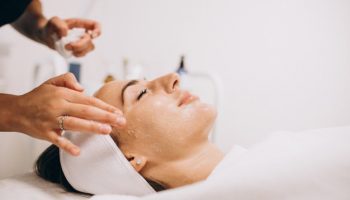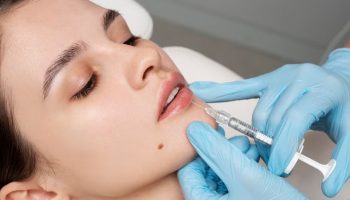Everybody can expect to experience dry skin at some point in their lives. However, eczema can present itchier and more painful issues. Both conditions are often mistaken for each other, so key distinctions must be made.
Moreover, the reasons for having dry skin often revolve around lifestyle factors and habits. Therefore, quick changes can be made to one’s routine to better the situation.
When it comes to eczema, healthcare professionals frequently need to intervene, guiding treatment on managing these conditions long-term.
There are many ways you can more acutely decipher what’s troubling your skin. To help you get to the root cause of these issues, we’ve provided you with some guidance that should help you tell the difference between dry skin and eczema.
Research Types of Eczema:
Eczema is a broad term. There are seven different types to be conscious of, so it’s worth keeping that in mind when you’re delving deeper into the potential issue.
- Atopic eczema – usually starts in early childhood and can flare up sporadically. The most common areas affected are skin creases, such as the elbow, neck, wrist, or behind the knees.
- Nummular eczema – causes very itchy and circular try skin to develop. The affected skin can leak fluids.
- Dyshidrotic eczema – causes itchy blisters to materialise upon one’s feet and hands. It’s also known as pompholyx.
- Stasis dermatitis – poor blood circulation in the lower legs causes eventually leads to infected skin in the region. This type of eczema requires long-term management.
- Seborrheic dermatitis – a common skin condition mainly causing flaky scales on the scalp. It’s often referred to as dandruff.
- Contact dermatitis – refers to eczema triggered by contact with substances that irritate the skin. If these products are avoided, the condition usually fades shortly after.
- Neurodermatitis – usually develops around the wrists, arms, neck, legs, forearms, and anal regions. The affected skin can be raised as well as sore and itchy.
Treatments are available for all conditions listed. It’s worth studying atopic eczema more as it’s the most common variant. Though you may have learned symptoms and treatment plans of one kind of eczema, it’s possible to suffer from multiple types simultaneously. It’s possible to grow out of some strands of eczema too.
Keep monitoring the situation and note any changes. Note the specificity of the symptoms. They will help you distinguish between regular bouts of dry skin and more irritable cases of eczema.
Related Resource: Shop for Beauty Products Online
Know Causes of Dry Skin
It’s important to know what eczema looks like. That said, it can also be helpful to know what isn’t a cause of eczema, as you’ll simply worry less about whether or not you’re likely to have it. At the same time, you can also begin a process of elimination to cure any dry skin you experience.
As mentioned previously, lifestyle factors often cause bouts of dry skin to occur or worsen. Anything that depletes the moisture in your skin should be looked at more closely.
These are influences such as frequent use of indoor heating or being exposed too often to colder climates. If you’re washing your hands too often, taking long hot showers, or using many hot soaps, this can also exacerbate your dry skin problems.
Simple changes can make a big difference here. However, if you incur lifestyle changes and notice your skin situation hasn’t changed much, it’s quite likely the situation could be eczema-related. If that’s the case, then you should dig a little deeper.
Investigate Family History Factors
Eczema doesn’t usually spring up out of nowhere. Often it comes from genes, meaning one’s family history can have an enormous influence here.
If you suspect you have eczema, doing some detective work amongst your family could be informative. Ask them if they have eczema. Before long, you should be able to notice a pattern of family members who may also be affected.
Of course, it’s important to be sensitive during these discussions. For example, the NHS acknowledges that eczema can lead to bullying during a person’s formative years. Though you’ll be asking adult family members about inheriting eczema, they could still feel great turmoil from those years.
Ask family members if they are comfortable discussing the issue in private, and be mindful that they could still feel self-conscious. If they decline, respect that, and perhaps consider approaching a family member who’s happy to talk about it instead.
Review Your Medical History
Your medical history can determine the likelihood of you suffering from eczema. Therefore, by reviewing it, you may be able to put more pieces of the puzzle together.
For example, people with food allergies can often be more prone to eczema. Seasonal allergies such as hayfever can also raise the likelihood of suffering. Those with asthma can also be more like to suffer from eczema.
Try to remember that other aspects of your medical history do not guarantee that you will suffer from eczema. Hysteria can ensue when browsing related conditions online, and the worst conclusions are sometimes drawn.
Remain calm, and if you’ve identified any potential linking factors, the next step is to present your concerns to a healthcare professional.
Speak to Your GP

You shouldn’t receive all your counsel online, even from expert resources. In-person consultations matter significantly, so a visit to your GP should help you understand your situation much better. They will be certain of the differences between dry skin and eczema.
Despite the UK’s healthcare system showing signs of struggle in recent times, some might argue that GPs have persevered as much as possible.
You should have confidence in these healthcare professionals and be willing to visit them for clarification on any medical concerns you have.
You should try to use the time spent with your GP as much as possible. When being seen for suspected eczema, you should;
- Present pictures of the affected area – Eczema can vary in intensity and flare at certain periods. Chart the entire spectrum of your experience and show your GP the evidence.
- Mention applicable triggers – Your mental well-being won’t be a cause of your eczema. That said, it can exacerbate symptoms. The hormone cortisol is released, and too much of it complicates your immune system and can inflame your skin. Mention your medical history too.
- Attend recommended support groups – If your eczema is crippling your self-confidence, your GP may recommend several support groups for you to attend and online resources to engage with. Do your best to follow through on their suggestions.
- Be open to further treatment – Your GP may refer you to a dermatologist to receive additional guidance or specialist treatment. Be open-minded and view your GP appointment as the first step in a process rather than a final solution.
Many people can delay seeing a GP, especially for non-life-threatening and potentially embarrassing conditions. Eczema can fall into that category of things, so try to dismiss those notions.
Realize your GP will have your best interests at heart and endeavor only to help and support you. Let that give you confidence when seeking their help.
Conclusion
It can be immensely challenging to distinguish between dry skin and eczema. Discrepancies often come down to details. So long as you attempt to stay informed and seek expert counsel, you’ll have everything you need to manage the situation, from trustworthy guidance to comforting treatment plans. In the end, there’s no good reason to have any lingering doubts about the matter.
Read Also:






![How to Rebuild Trust in a Relationship [According to Experts]](https://www.rslonline.com/wp-content/uploads/2024/12/How-to-Rebuild-Trust-in-a-Relationship-According-to-Experts-2-100x91.jpg)
![How to Fix a Broken Relationship [Expert’s Advice You Need to Read]](https://www.rslonline.com/wp-content/uploads/2024/12/How-to-Fix-a-Broken-Relationship-Experts-Advice-You-Need-to-Read-100x91.jpg)





















